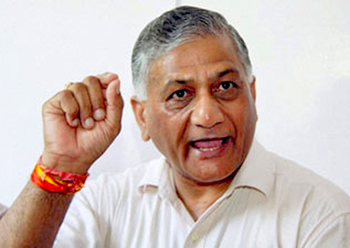New Delhi, Apr 12: Union Minister General VK Singh today alleged that an "insidious campaign" is being run against him by a section of media, at the behest of the arms lobby that is "working overtime" to subdue him, and that he has briefed Prime Minister Narendra Modi about it.
"It is only an insidious campaign in which the arms lobby is working overtime. They were not able to subdue me when I was the Army chief. They have carried on," Gen Singh said while accusing a former senior Army official of being a part of the conspiracy.
 "I won't go beyond saying as to what relationships he enjoys with various chaps. There are a lot of people who were paid by him. So, obviously, you have some journalists and others who will write what they are told," he said.
"I won't go beyond saying as to what relationships he enjoys with various chaps. There are a lot of people who were paid by him. So, obviously, you have some journalists and others who will write what they are told," he said.
He was reacting to the controversy which erupted after his visit to Pakistan High Commission in New Delhi on March 23 for a reception.
He had faced criticism on social and the electronic media over his visit.
Defending his presence at the Pakistan High Commission, the former Army chief said, "It was just protocol. I was the Army Chief earlier and now am a Union Minister."
He said he was deeply upset that the moment he came out of the Pakistani Mission, panels were up on TV saying Army morale has been lowered, which he felt was ridiculous.
"I was very upset with the charges levelled and the accusations made against me. Doing something as per protocol is different from conducting policies. And, hence, I tweeted definition of two words - duty, disgust. Duty was about me going there and disgust was the way I felt about the way the channels were playing it up. But it was also twisted by a section of the media," he said.
Gen Singh added that following the campaign against him for his presence at Pakistan Day, he had spoken to the Prime Minister and explained why he was being targeted.
"I also told the Prime Minister that this was an orchestrated campaign... That is my way of working. Come out clear, don't hide your punches. I told him this was a motivated campaign, this is what has happened. I leave it to you to find out who is motivating it," he said.
Asked what PM Modi's response was, Gen Singh said he understood. "He is too media savvy not to understand it. He said leave it to me," he said.
The Minister courted another controversy during the evacuation process in Yemen when he took a swipe at the media saying the operation was not as exciting as his visit to the Pakistani mission.
"I was joking about the fact that my 15 minutes in Pakistan High Commission got so much air time but not the evacuation process," he said. His comments had created a controversy.
He had later tweeted using the word "presstitutes" for a TV channel for playing up his comparison remarks.
However, Mr Singh apologised to journalists for using the word, barring a small section of media persons who, he said, were carrying out a "motivated campaign" against him.
Meanwhile, he also said that the arms lobby is still active against him. "They did a lot to dole out resources when the elections took place. We know how much money was received by various people. They are active. They are very active. Their sole aim is to how to get me out," he said.
Meanwhile, talking about defence procurement, Gen Singh said he had spoken to Defence Minister Manohar Parrikar about the state of affairs. "I have had a word with him. I have explained to him what it is," he said.
"The policy has to be such that it makes things relevant. I have said that our procurement policy is like a game of snakes and ladders in which there are no ladders and only snakes. You can be bitten any time and you come to zero. Not even anywhere in between," he said.





Comments
Add new comment